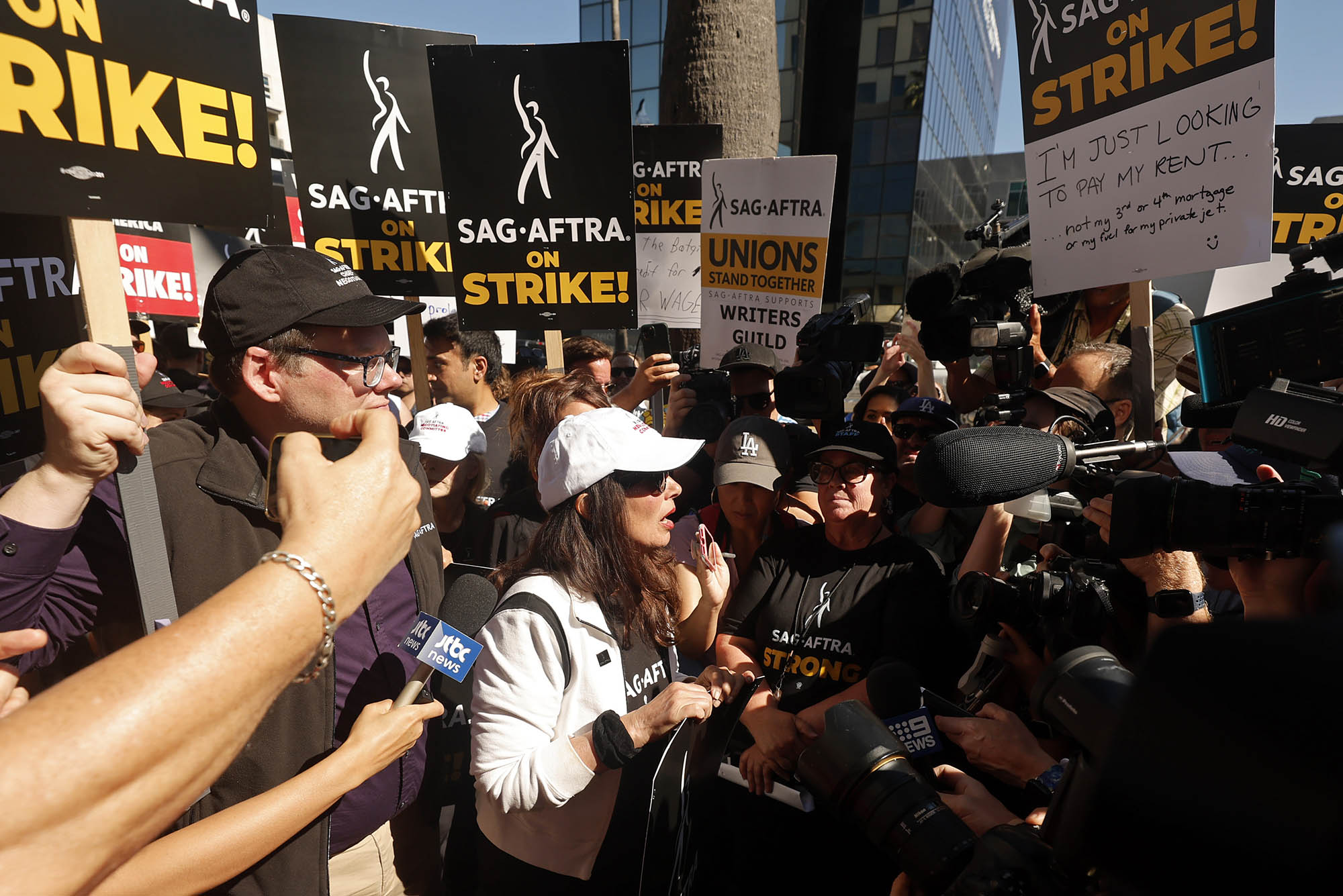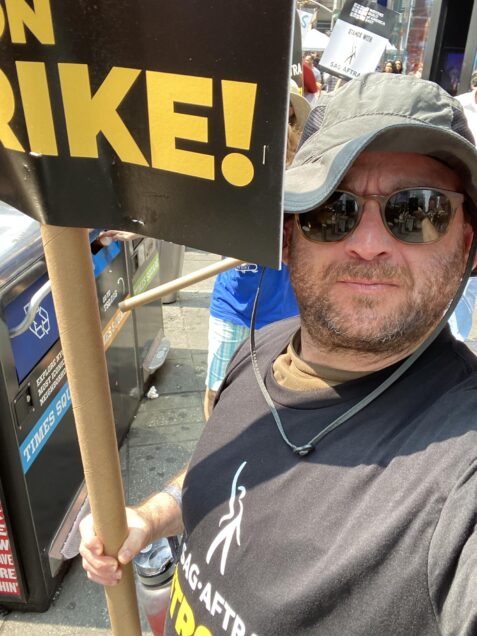Hollywood Strikes and BU Acting Alums Explain Why Their Fight Matters

Photo by Emma McIntyre/Getty Images
Hollywood Strikes and BU Acting Alums Explain Why Their Fight Matters
“We as a society need to choose if we’re going to let corporate greed rule our lives or not,” says CFA alum and actor David J. Castillo
This article was originally published in Bostonia on July 21, 2023. By Jim Sullivan
Excerpt
The irony is that it’s precisely the kind of feud that would make for a scripted TV drama series. The only problem is that there’s nobody available to write it, direct it, or act in it. They are all on strike. Two months after the Writers Guild of America (WGA) went on strike, demanding and failing to get a better contract from Hollywood studios, the Screen Actors Guild–American Federation of Television and Radio Artists (SAG-AFTRA) is following the same path. Their contract expired at the end of June. It’s the first actors strike since 1980 and the first time since 1960 that writers and actors have simultaneously been on strike.
Hollywood is shut down. Productions are shut down. Even promotions for current movies and shows are shut down. Actors, similar to writers, are focused on three main issues: fairer wages for those at the lower end of the pay scale, control over use of artificial intelligence (AI) (in this case, not allowing your likeness be used to create new programs without your involvement and compensation), and improved residual payments in the ever-expanding streaming world.
Boston University has a number of alumni who are actors working in Hollywood. After the SAG strike vote was called July 13, BU Today spoke with four of them. There was unanimity in their anger and frustration, their belief in the cause, in the necessity of the strike.
“If not now, when?”
“If not now, when?” says Dave Shalansky (CFA’96), who’s acted in Grey’s Anatomy and Gilmore Girls. “We have been dormant long enough. Perhaps too long. But we can’t harp on the past. The time to strike is now. There is too much at stake.”
“We as a society need to choose if we’re going to let corporate greed rule our lives or not,” says David J. Castillo (CFA’17), who had roles in The Rookie and Ant-Man and the Wasp: Quantumania. “And I’m happy my union decided to say no.”
“There is nothing else we could do,” says veteran actor Michelle Hurd (CFA’88), most recently featured as Raffi Musiker in Star Trek: Picard.
Hurd is a member of the committee that had been trying for 35 days to negotiate with the studio consortium, the Alliance of Motion Picture and Television Producers (AMPTP). “The negotiators did not lose their cool,” she says. “I’m so proud to be part of this committee. If you’ve heard that SAG-AFTRA has been divisive, we had no divisiveness here. We came together and dropped our differences at the door—we have one enemy and that is the AMPTP.”
Hurd spent much of July 17, the day BU Today talked with her, on picket lines in New York outside 30 Rock and 1515 Broadway in 90-degree-plus heat. “I’m exhausted, but it was fantastic,” she said later that night.
She was still full of fire. “So many actors rising to the occasion! It was packed with actors and writers. Cars were beeping their horns. The energy is very powerful, and we all know we’re on the right side of history on this one.”
So many actors rising to the occasion! It was packed with actors and writers. Cars were beeping their horns. The energy is very powerful, and we all know we’re on the right side of history on this one.
“Existential threat” is the phrase many of the WGA strikers were using, especially as it concerned the studios’ use of artificial intelligence. That was also a key component of what Fran Drescher, SAG-AFTRA president, said at a news conference announcing the strike. She railed at the studios, saying “AI poses an existential threat to creative professions.”
“We can’t survive,” Hurd says. “I’ve been an actor over 30 years, and when I graduated BU and moved to New York, I began acting. Never had any other job. I supported myself, and I take pride in that. And then 10 years ago, things started to change because of streaming, Friends starting calling me saying, ‘We can’t make rent, we’re falling off [qualifying for] insurance.’” (Actors need to make $26,000 a year to qualify.)
Hurd says that before the ascendance of streaming, things were mostly good. “But a new business model was forced upon us. When we had linear episodes, it was a cash cow—everyone was winning. But with streaming, you’d work for four to five months for 20 episodes and the studios would take years to inform their actors if the show would be picked up and if they would be picked up. We were not allowed to take other series.

Photo by Dave Shalansky

Photo courtesy of Michelle Hurd
“Residuals from streaming disappeared and completely changed the script of how we made our living. The streamers want to tell us their business model was not what they thought it would be, but that’s on them. For us to contort ourselves to fit into their [world] is insidious, condescending, and gross.”
Baron Vaughn (CFA’03) played Nwabudike Bergstein on Grace and Frankie, the adopted son and lawyer-to-be during the show’s eight season run on Netflix. The timing of the strike, he says, “is indicative of the fact that everything is backwards: the people who created the content do not feel they’re being valued. The tech takeover means that everybody is doing a lot more for a lot less. It’s the tech ethos, which tends to devalue labor. Like Elon Musk said when he took over Twitter, [you have] to be hard-core for very little compensation.
The timing of the strike is indicative of the fact that everything is backwards: the people who created the content do not feel they’re being valued. The tech takeover means that everybody is doing a lot more for a lot less. It’s the tech ethos, which tends to devalue labor. Like Elon Musk said when he took over Twitter, [you have] to be hard-core for very little compensation.
“I was on Grace and Frankie long enough to see Netflix change three different times,” Vaughn says. “It was an interesting thing to see Netflix as a fledgling company becoming the master of all of Hollywood. Then, at the last company function for that show, after the news that Netflix had lost subscribers, I saw the beginning of the writing on the wall. The reality we’re seeing started about that time.”
Big stars making noise
Although both strikes are happening simultaneously, the SAG strike may resonate more with the general public. It doesn’t hurt to have the big stars make noise. Before the vote to strike was taken, Cambridge-raised megastar Matt Damon, while on a promotional tour for Oppenheimer (which opened this weekend), told the Associated Press: “What we would be striking for, if we strike, is unbelievably important. We got to protect the people who are kind of on the margins.”
Damon cited that $26,000 year minimum: “Residual payments are what carry them across that threshold. If those residual payments dry up, so does their healthcare, and that’s absolutely unacceptable.” Like all the stars, Damon cannot do any more promotion during the strike.
Yet they were able to do exactly that during early July—for Oppenheimer, Barbie, Indiana Jones and the Dial of Destiny, and Mission Impossible: Dead Reckoning Part One—when the AMPTP negotiated for a 12-day extension of the bargaining time frame. (The Oppenheimer stars did walk off the red carpet in London just prior to the strike. According to director Chris Nolan, they were “off to write their picket signs.”)
What Hurd saw, ultimately, she says, was deceitful gamesmanship on the part of the AMPTP. They failed to discuss issues until the very end, she says, coming back on the last day and offering “a partial response to a proposal on AI.”
Why did they do this? The timing of the strike came just as the Barbie and Oppenheimer blockbuster weekend was approaching.
“They wanted the movies this summer to have their red-carpet premieres,” Hurd says.
There’s a meme that’s been circulating since the strike began. Images of actor Linda Hamilton as Terminator heroine Sarah Connor juxtaposed with that of Fran Drescher as the big-haired title character in The Nanny. Under Hamilton: “The woman we thought would lead the rebellion against the machines” and under Drescher: “The woman who ended up leading the rebellion against the machines.”
“Fran has been outstanding and such a powerful force. AMPTP underestimated her,” Hurd says. “She said, ‘I’m not gonna let you bully us anymore’ and she was intimidating.”